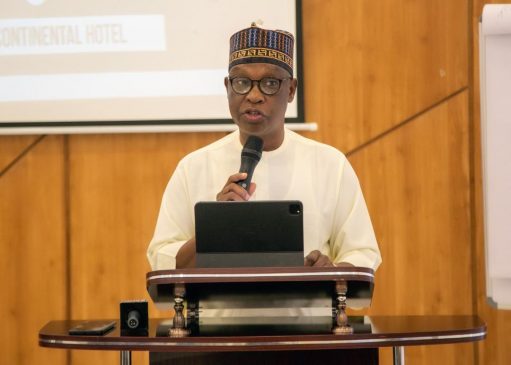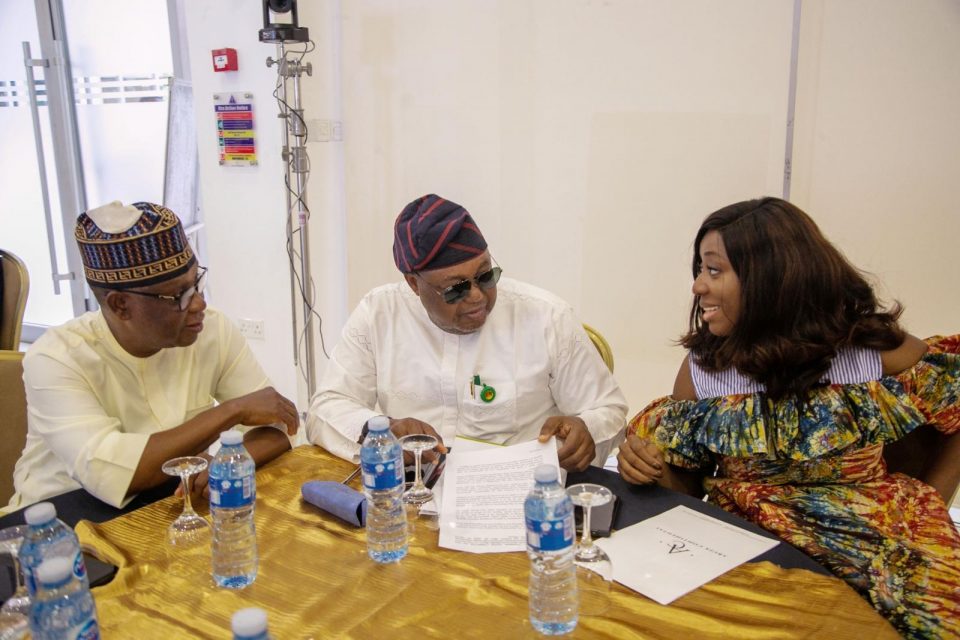Photo caption from left: Executive Secretary of NEITI, Dr. Orji Ogbonnaya Orji; Representative of the Honourable Chairman, House Committee on Gas Resources, Hon. Mutu Nicholas Ebomo – Hon. Aluko Ahmed Yinka; and the Senior Country Officer, Natural Resource Governance Institute (NRGI), Ms Tengi George Ikoli at the Policy Dialogue on Strengthening Methane Emissions Regulatory Reforms in the Oil and Gas Sector held in Abuja
By Emeka Ugwuanyi
The Nigeria Extractive Industries Transparency Initiative (NEITI) has called for a clear policy declaration that must institutionalize a methane governance regime that is robust, enforceable, transparent, and aligned with international best practices as the era of business-as-usual in methane emissions management is over.
The Executive Secretary of NEITI, Dr. Orji Ogbonnaya Orji, stated this at a high-level policy dialogue on “Strengthening Methane Emissions Framework” held today in Abuja in collaboration with the Natural Resources Governance Institute (NRGI) and Paradigm Leadership Support Initiative (PLSI).
The Executive Secretary explained that Methane is over 80 times more potent than carbon dioxide in its impact on global warming. Nigeria cannot claim seriousness on climate commitments, if we ignore the silent crisis of methane pollution across our extractive industries.
“Nigeria’s climate commitments will remain hollow without concrete action on methane reduction. Methane action is climate action, economic action, and social justice,” Dr. Orji reiterated.
As part of its intervention, NEITI announced the adoption of a new Energy Transition and Climate Accountability Framework, which mandates:
- Mandatory tracking of greenhouse gas (GHG) emissions and climate risks.
- Independent oversight of oil company divestments.
- Monitoring of Host Community Development Trusts under the Petroleum Industry Act (PIA).
- Alignment of NEITI audit cycles with Nigeria’s Nationally Determined Contributions (NDCs).
- Bi-annual public performance reviews on emissions.

Photo caption: Executive Secretary of NEITI, Dr. Orji Ogbonnaya Orji at the Policy Dialogue on Strengthening Methane Emissions Regulatory Reforms in the Oil and Gas Sector held in Abuja.
The Executive Secretary revealed that NEITI has already integrated methane and greenhouse gas disclosures into its 2022 and 2023 oil and gas industry reports, with fifteen companies reporting emissions data. “Going forward, NEITI will not publish any extractive industry report without climate and emissions data. This is a new standard and a non-negotiable requirement,” he stated.
The Executive Secretary announced that in furtherance of its mandate, NEITI committed to:
- Integrate methane tracking in its audits of the solid minerals and gas sectors.
- Publish annual Methane Emissions Scorecards for companies.
- Advocate for penalties and incentives linked to emissions performance.
- Work with the judiciary to ensure environmental compliance through legal enforcement.
NEITI expressed concern over the volume of gas flared in 2023, amounting to 183.408 billion standard cubic feet (SCF), with an estimated economic value of $458.52 million or ₦685.95 billion. Dr. Orji emphasized that such losses, if sustained, could amount to over $2.29 billion or ₦3.43 trillion in five years funds that could support education, health, infrastructure, and climate resilience for host communities.
NEITI called on the National Assembly and regulators to strengthen enforcement provisions in the PIA and ensure transparent and accountable issuance of permits under the 2023 Gas Flaring, Venting, and Methane Emissions Regulations.
NEITI reaffirmed its commitment to using data, dialogue, and its regulatory leverage to drive reforms and promote environmental integrity across the extractive sector.
The Honourable Chairman, House Committee on Gas Resources, Hon Mutu Nicholas Ebomo, represented by Hon Aluko Ahmed Yinka affirmed that the House Committee on Gas Resources is fully aware of the delicate balance between maximizing the economic potential of our gas sector and ensuring that we do so in a manner that is environmentally responsible and sustainable.
“We are committed to working with all stakeholders, government agencies, civil society, development partners, and the private sector, to establish a coherent and enforceable framework that promotes transparency, data integrity, and accountability across the gas value chain”. -Hon Aluko Ahmed Yinka noted.
Hon. Aluko Ahmed Yinka stated that the Committee is open to supporting legislative measures that will address identified gaps in the current regulatory and operational practices and is ready to play its part, through policy reform, oversight, and collaboration, to ensure Nigeria meets its climate obligations while maintaining investor confidence in the gas industry.
The Senior Country Officer of the Natural Resource Governance Institute (NRGI), Ms. Tengi George Ikoli in her goodwill message commended Nigeria for its strong commitment both nationally and internationally. She expressed hope that Nigeria is moving towards achieving Methane Emissions in line with global best practices.
“At the same time, Nigeria is scaling up natural gas development as part of its energy and economic strategy. This is a sovereign choice. But with that choice comes responsibility—to ensure that the sector is governed in a way that is transparent, efficient, environmentally safe, and socially responsive”. Ms Ikoli stated.
The Senior Officer, NRGI highlighted that natural gas is composed of over 90% methane—a highly potent greenhouse gas. So, as we scale up gas exploration and infrastructure, we must also confront the very real risk that methane emissions will increase. Without adequate regulation and oversight, this increase could offset the very gains we aim to make—both environmentally and economically.
“If Nigeria is to pursue gas as a transition fuel, it must make the case convincingly—by strengthening its methane governance framework so that this pathway remains realistic, competitive, and aligned with global standards and climate imperatives. This is especially urgent in the face of evolving international regulations like the EU Methane Regulation, which could soon affect market access for Nigeria’s exports” She explained.
Ms. Tengi-George Ikoli commended NEITI for playing a pivotal role in moving emissions data into the public domain. For the first time, 15 oil and gas companies in Nigeria disclosed their greenhouse gas emissions data—an important milestone. But as we all know; disclosure alone is not enough. Much more remains to be done to turn that data into accountability, and that accountability into results.
The Executive Director of the Paradigm Leadership Support Initiative (PLSI), Mr. Olusegun Elemo stated that Data insight is not just an activity but one that allows collaboration with the government and important stakeholders.
Mr Elemo noted that the PLSI is fully committed to the process of achieving methane reduction and will continue to collaborate with stakeholders and actors in the process to ensure the goal is met.
The dialogue concluded with a strong consensus that Nigeria must institutionalize a robust, transparent methane governance regime in line with global best practices.
Key stakeholders on methane emission such as government regulators from the National Council on Climate Change (NCCC), Federal Ministry of Petroleum Resources (FMoPR), Federal Ministry of Environment (FMoE) Nigeria Upstream Regulatory Commission (NUPRC) etc. industries, civil society organisations, media, and development partners were in attendance at the event.



